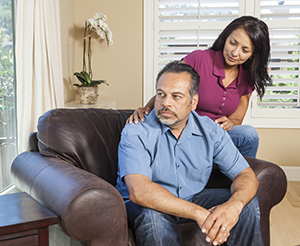It’s hard to watch a loved one deal with mental illness. You want to help. Yet you may not know what to do. Your loved one may even push you away. But don’t give up. Your support is needed now more than ever. Talk with your loved one's doctor. Or contact a group for families of people with mental illness. They can help give you the guidance you need.
What you can do
Living with mental illness can be overwhelming. Your loved one may say or do things that shock or frighten you. Sometimes your loved one may resist treatment. Knowing what to do can help you cope.
-
Help your loved one get the right care. Often people with a mental illness deny there’s a problem. Or they may not be able to seek help on their own.
-
Encourage your loved one to stick with treatment. This may be your most important job. Medicines that treat mental illness can have side effects. As a result, your loved one may stop taking them. But this will likely cause symptoms to come back. You might also want to go to doctor visits with your loved one to discuss medicine and other issues.
-
Educate yourself. Learn more about the illness. Find out about symptoms and common side effects of medicines. This can help you provide the right kind of support and understand what to expect.
-
Provide emotional support. Encourage your loved one to share their feelings. Listen and don’t judge. Let your loved one know they can count on you.
-
Be patient. The healing process takes time. In some cases, your loved one may never fully recover. But their symptoms will likely improve.
-
Be an advocate. Other family members and friends may have a hard time understanding what is happening. Educate them about mental illness and provide concrete ways they can help your loved one. For example, urge them not to ask a lot of questions. Ask them to include your loved one in family activities. And ask them to be patient if a response takes longer than normal. Be quick to put a stop to demeaning, hurtful comments. Work with community resources so that effective support can be provided.
-
Ask them to join in. Invite your loved one to take part in activities. But don’t push.
-
Take care of yourself. Helping your loved one can be very stressful. Take time to care for yourself. Try to get enough sleep, follow a balanced diet and maintain your own interests. You’ll have more patience and will be better able to cope.
Getting help
-
If you are worried your loved one may harm themselves or attempt suicide, ask them. Asking doesn’t cause suicide.
-
If the suicide risk is not immediate, call your loved one's doctor. Go to a local mental health clinic. Or call the 988 Suicide & Crisis Lifeline at 800-273-TALK (800-273-8255). It's open 24 hours a day, every day. They speak English and Spanish. This resource provides immediate crisis intervention and information on local resources. It is free and confidential.
-
Don’t ignore your loved one's talk of suicide or think it’s just an attention-seeking behavior. As hard as it is, talking can save a life.
Call or text 988
-
Call or text
988 if your loved one is at immediate risk of suicide (they have a suicide plan and access to a method such as guns or drugs) or have plans to harm others. Don’t leave the person alone and don't let them out of your sight. Remove any guns and medicines. When you call or text988 , you will be connected to trained crisis counselors at the 988 Suicide & Crisis Lifeline. An online chat option is also available at chat.988lifeline.org. The service is free and available 24/7.
To learn more
-
988 Suicide & Crisis Lifeline, 800-273-TALK (800-273-8255), 988lifeline.org
-
National Alliance on Mental Illness, 800-950-6264, www.nami.org
-
National Institute of Mental Health, 866-615-6464, www.nimh.nih.gov
-
Mental Health America, 800-969-6642, www.nmha.org


